|
|
|
Sort Order |
|
|
|
Items / Page
|
|
|
|
|
|
|
| Srl | Item |
| 1 |
ID:
132341
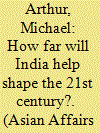

|
|
|
|
|
| Publication |
2014.
|
| Summary/Abstract |
In the wake of the BJP's crushing defeat of Congress in the national elections held in May 2014 the author assesses India's prospects and potential in the light of the oft-made comparison with China. India is famously diverse, the largest democracy in the world, with a relatively young population. India is secular, in the sense that state and religion are not linked, but at the same time India is a deeply spiritual society, diversely religious. In all these areas China's experience is wholly different, but not necessarily better, though in purely economic terms China is far ahead of India and Indian underperformance. Nonetheless, India is likely to be just as central to global issues like climate change, the Digital Revolution, public health and migration. In addition, managing all aspects of the relationship with Pakistan will be one of the key issues for 21st century security. In all this, while poverty, caste and appalling governance will hold India back, diversity, tolerance and an entrepreneurial culture should help her forward.
|
|
|
|
|
|
|
|
|
|
|
|
|
|
|
|
| 2 |
ID:
143148
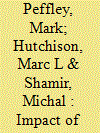

|
|
|
|
|
| Summary/Abstract |
How do persistent terrorist attacks influence political tolerance, a willingness to extend basic liberties to one's enemies? Studies in the U.S. and elsewhere have produced a number of valuable insights into how citizens respond to singular, massive attacks like 9/11. But they are less useful for evaluating how chronic and persistent terrorist attacks erode support for democratic values over the long haul. Our study focuses on political tolerance levels in Israel across a turbulent 30-year period, from 1980 to 2011, which allows us to distinguish the short-term impact of hundreds of terrorist attacks from the long-term influence of democratic longevity on political tolerance. We find that the corrosive influence of terrorism on political tolerance is much more powerful among Israelis who identify with the Right, who have also become much more sensitive to terrorism over time. We discuss the implications of our findings for other democracies under threat from terrorism.
|
|
|
|
|
|
|
|
|
|
|
|
|
|
|
|
| 3 |
ID:
130184
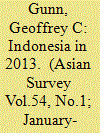

|
|
|
|
|
| Publication |
2014.
|
| Summary/Abstract |
Ahead of upcoming elections, expectations ran high in 2013 across the archipelago for a highly pluralistic electorate. With China as a leading trading partner, the backdrop for Indonesia was steady economic growth, albeit checked by a sliding currency, a current account deficit, and a depressing culture of corruption. Mixing commerce and geopolitics, China, the U.S., and Japan all turned to Indonesia to expand their influence.
|
|
|
|
|
|
|
|
|
|
|
|
|
|
|
|
| 4 |
ID:
169003


|
|
|
|
|
| Summary/Abstract |
How does civil war shape the prospects of lasting peace between formerly opposing ethnic groups after the end of violence? This article addresses the complex relationship between war experience, interethnic attitudes, interethnic forgiveness, and the willingness to permit basic civil liberties to former enemies in the context of postwar Sri Lanka. Despite the end of the 26-year-long civil war in 2009, social and political tensions between the two largest ethnic groups, the Sinhalese and the Sri Lankan Tamils, still prevail. Political tolerance is in the literature considered a crucial micro-level condition for peaceful coexistence, yet, its determinants, in particular the role of war experiences, have not received sufficient attention. Using new and unique all-island representative survey data (N = 1,420), we examine the mutual permission of civil liberties of these two ethnic groups. Our analyses reveal two important findings: first, the likelihood of granting civil liberties varies by civil liberty and ethnic group. Whereas most members of both ethnic groups are willing to grant the right to vote, to hold a speech, and to hold a government position, the right to demonstrate is highly contested, with only low shares of both Tamils and Sinhalese being willing to grant the other group this right. Second, the structural equation models reveal that the direct impact of war exposure is less powerful than expected and depends on the political right in question. Not forgiving the other ethnic group, partly driven by war experience and ethnic prejudice, appears to be a more consistent predictor of intolerance. These results imply that postwar efforts to further forgiveness are important to promote political tolerance and thereby long-lasting peace.
|
|
|
|
|
|
|
|
|
|
|
|
|
|
|
|
| 5 |
ID:
120960
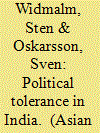

|
|
|
|
|
| Publication |
2013.
|
| Summary/Abstract |
This study of political tolerance in India reveals a positive correlation between such tolerance and membership in political parties and unions, and living in urban areas. Surprisingly, the study finds no difference in the levels of political tolerance between BJP and Congress (I) supporters, and no connection with education levels.
|
|
|
|
|
|
|
|
|
|
|
|
|
|
|
|
| 6 |
ID:
095476
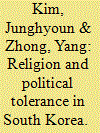

|
|
|
|
|
| Publication |
2010.
|
| Summary/Abstract |
This paper examines the relationship between individuals' religiosity and its impact on political tolerance in South Korea. Based on the results of survey data analysis, we find that there are inter-denominational as well as intra-denominational differences of religiosity that influence levels of political tolerance among South Koreans. In terms of the inter-denominational differences (the ethnoreligious thesis), we find that Buddhists tend to be more tolerant than Protestants, and Protestants tend to have the lowest level of political tolerance in South Korea. In terms of the intra-denominational differences (the culture wars thesis), religious traditionalists have a lower level of political tolerance than religious modernists in South Korea. This paper argues that there is a statistically significant relationship between individuals' religiosity and their level of political tolerance, and that a composite model (combining the ethno-religious model and the culture wars model) is the best way of investigating such a relationship in the Korean context.
|
|
|
|
|
|
|
|
|
|
|
|
|
|
|
|
| 7 |
ID:
186809
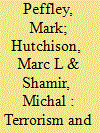

|
|
|
|
|
| Summary/Abstract |
How does terrorism influence citizens’ willingness to deny basic liberties to domestic groups alleged to be “fellow travelers” of the perpetrators of terrorism? Based on intergroup threat theory and social identity theory, we hypothesize that political intolerance toward fellow traveler groups is determined by three factors: (1) the level of terrorism, (2) the degree to which domestic outgroups are alleged to be demographically or politically associated with terrorist groups, and (3) whether individuals identify strongly with the political Right. Consistent with our hypotheses, we find that higher levels of terrorism in Israel over a thirty-year period produce a “diffusion of political intolerance” among Israeli Jews on the Right that extends to domestic groups distant from the perpetrators of terrorism. Our findings have important implications for the study of terrorism, democracy, and political tolerance.
|
|
|
|
|
|
|
|
|
|
|
|
|
|
|
|
| 8 |
ID:
133714
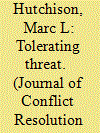

|
|
|
|
|
| Publication |
2014.
|
| Summary/Abstract |
Research on civil conflict focuses primarily on identifying underlying and proximate causes while leaving many questions of subsequent social consequences unanswered. Few studies have systematically examined how these conflicts affect public opinion, especially tolerance attitudes. Additionally, cross-national comparisons reveal significant differences in political tolerance levels but few explanations accounting for this variation. In this study, I bring together these disparate literatures and demonstrate the negative, independent effects of civil conflict on political tolerance levels across thirty-two countries. Examining data from the 1995-97 World Values Survey using several statistical techniques to ameliorate problems with endogeneity and multilevel data, I find that civil conflict dampens the public's willingness to extend basic civil liberties to nonconformist groups. By assessing the extent of domestic intolerance generated by various forms of civil conflict, this study makes important contributions to existing literatures and, more importantly, identify another obstacle to sustained peace in postconflict societies.
|
|
|
|
|
|
|
|
|
|
|
|
|
|
|
|
| 9 |
ID:
178719
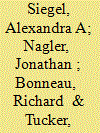

|
|
|
|
|
| Summary/Abstract |
Do online social networks affect political tolerance in the highly polarized climate of postcoup Egypt? Taking advantage of the real-time networked structure of Twitter data, the authors find that not only is greater network diversity associated with lower levels of intolerance, but also that longer exposure to a diverse network is linked to less expression of intolerance over time. The authors find that this relationship persists in both elite and non-elite diverse networks. Exploring the mechanisms by which network diversity might affect tolerance, the authors offer suggestive evidence that social norms in online networks may shape individuals’ propensity to publicly express intolerant attitudes. The findings contribute to the political tolerance literature and enrich the ongoing debate over the relationship between online echo chambers and political attitudes and behavior by providing new insights from a repressive authoritarian context.
|
|
|
|
|
|
|
|
|
|
|
|
|
|
|
|
|
|
|
|
|